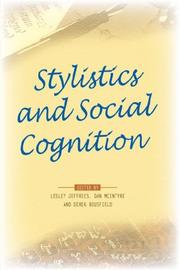| Listing 1 - 10 of 45 | << page >> |
Sort by
|

ISBN: 0198246072 Year: 1980 Publisher: Oxford Clarendon
Abstract | Keywords | Export | Availability | Bookmark
 Loading...
Loading...Choose an application
- Reference Manager
- EndNote
- RefWorks (Direct export to RefWorks)
Cognitive psychology --- Social perception --- Perception sociale --- Cognition, Social --- Interpersonal perception --- Social cognition --- Interpersonal relations --- Perception --- Social cognitive theory --- Social perception.
Book
ISBN: 0631151001 Year: 1974 Publisher: Oxford Blackwell
Abstract | Keywords | Export | Availability | Bookmark
 Loading...
Loading...Choose an application
- Reference Manager
- EndNote
- RefWorks (Direct export to RefWorks)
Cognitive psychology --- Social perception --- Cognition, Social --- Interpersonal perception --- Social cognition --- Interpersonal relations --- Perception --- Social cognitive theory --- Social perception.
Book
ISBN: 0471921092 Year: 1968 Publisher: London Wiley
Abstract | Keywords | Export | Availability | Bookmark
 Loading...
Loading...Choose an application
- Reference Manager
- EndNote
- RefWorks (Direct export to RefWorks)
Social psychology --- Social perception --- Perception sociale --- 159.93 --- Cognition, Social --- Interpersonal perception --- Social cognition --- Interpersonal relations --- Perception --- Social cognitive theory --- Zintuiglijke waarnemingen --- Social perception. --- 159.93 Zintuiglijke waarnemingen
Book
ISBN: 0262019019 0262313278 9780262313278 9780262019019 0262313286 Year: 2013 Publisher: Cambridge, Mass. The MIT Press
Abstract | Keywords | Export | Availability | Bookmark
 Loading...
Loading...Choose an application
- Reference Manager
- EndNote
- RefWorks (Direct export to RefWorks)
"In this novel account of distinctively human social cognition, Tadeusz Zawidzki argues that the key distinction between human and nonhuman social cognition consists in our complex, diverse, and flexible capacities to shape each other's minds in ways that make them easier to interpret. Zawidzki proposes that such "mindshaping"--Which takes the form of capacities and practices such as sophisticated imitation, pedagogy, conformity to norms, and narrative self-constitution--is the most important component of human social cognition. Without it, he argues, none of the other components of what he terms the "human sociocognitive syndrome," including sophisticated language, cooperation, and sophisticated "mindreading," would be possible. Challenging the dominant view that sophisticated mindreading--especially propositional attitude attribution--is the key evolutionary innovation behind distinctively human social cognition, Zawidzki contends that the capacity to attribute such mental states depends on the evolution of mindshaping practices. Propositional attitude attribution, he argues, is likely to be unreliable unless most of us are shaped to have similar kinds of propositional attitudes in similar circumstances. Motivations to mindshape, selected to make sophisticated cooperation possible, combine with low-level mindreading abilities that we share with nonhuman species to make it easier for humans to interpret and anticipate each other's behavior. Eventually, this led, in human prehistory, to the capacity to attribute full-blown propositional attitudes accurately--a capacity that is parasitic, in phylogeny and today, on prior capacities to shape minds. Bringing together findings from developmental psychology, comparative psychology, evolutionary psychology, and philosophy of psychology, Zawidzki offers a strikingly original framework for understanding human social cognition."--Publisher's website.
Social cognitive theory. --- Social perception. --- Social psychology. --- Social perception --- Social psychology --- Social cognitive theory --- Sociology & Social History --- Social Sciences --- Social Change --- SCT (Social cognitive theory) --- Social cognition theory --- Mass psychology --- Psychology, Social --- Cognition, Social --- Interpersonal perception --- Social cognition --- Social learning --- Human ecology --- Psychology --- Social groups --- Sociology --- Interpersonal relations --- Perception --- PHILOSOPHY/Philosophy of Mind/General --- COGNITIVE SCIENCES/General --- Affective and dynamic functions --- Cognitive psychology
Book
ISBN: 9781841694511 1841694517 9780203837948 9781136874123 9781136874161 9781136874178 9781138876743 Year: 2009 Publisher: New York Psychology press
Abstract | Keywords | Export | Availability | Bookmark
 Loading...
Loading...Choose an application
- Reference Manager
- EndNote
- RefWorks (Direct export to RefWorks)
Cognitive psychology --- Social psychology --- Social perception. --- Social psychology. --- Perception sociale --- Psychologie sociale --- Social perception --- Mass psychology --- Psychology, Social --- Human ecology --- Psychology --- Social groups --- Sociology --- Cognition, Social --- Interpersonal perception --- Social cognition --- Interpersonal relations --- Perception --- Social cognitive theory
Book
ISBN: 3770522834 Year: 1985 Publisher: München Fink
Abstract | Keywords | Export | Availability | Bookmark
 Loading...
Loading...Choose an application
- Reference Manager
- EndNote
- RefWorks (Direct export to RefWorks)
Sociological theories --- Social distance --- Social perception --- 316.47 --- Cognition, Social --- Interpersonal perception --- Social cognition --- Interpersonal relations --- Perception --- Social cognitive theory --- Social interaction --- Social isolation --- Social participation --- Sociale relaties --(sociologie) --- 316.47 Sociale relaties --(sociologie) --- Distance, Social
Book
ISBN: 9781473969308 1473969301 9781473969292 1473969298 Year: 2017 Publisher: Los Angeles, Calif. Sage
Abstract | Keywords | Export | Availability | Bookmark
 Loading...
Loading...Choose an application
- Reference Manager
- EndNote
- RefWorks (Direct export to RefWorks)
Fiske and Taylor carefully integrate the many new threads of social cognition research that have emerged, including developments within social neuroscience, cultural psychology and some areas of applied psychology, and continue to tell a powerful and comprehensive story about what social cognition is and why it's a significant phenomenon in society today. Every chapter now includes figures and tables, glossary entries, and further readings.
Social perception. --- Cognitive neuroscience. --- Cognitive neuropsychology --- Cognitive science --- Neuropsychology --- Cognition, Social --- Interpersonal perception --- Social cognition --- Interpersonal relations --- Perception --- Social cognitive theory --- Social perception --- Cognitive neuroscience --- Developmental psychology --- Cognitive psychology --- Social psychology --- Sociale psychologie

ISBN: 9401200645 143561108X 9781435611085 9042023120 9789042023123 9789042023123 9042023120 Year: 2007 Publisher: Amsterdam Rodopi
Abstract | Keywords | Export | Availability | Bookmark
 Loading...
Loading...Choose an application
- Reference Manager
- EndNote
- RefWorks (Direct export to RefWorks)
This volume of articles comprises papers from the 25th annual conference of the Poetics and Linguistics Association (PALA), which was held at the University of Huddersfield, England, in July 2005. The theme of the conference was ‘Stylistics and Social Cognition’, and as usual at a PALA conference, this theme was interpreted very widely by the participants, as the reader of this book will no doubt conclude. At the heart of this volume, there is something of a reaction against the cognitive developments in stylistics, which might be seen as being in danger of privileging the individual interpretation of literature over something more social. The concern is to consider whether there is a more collective approach that could be taken to the meaning of text, and whether recent insights from cognitive stylistics could work with this idea of collectivity to define something we might call ‘commonality’ of meaning in texts. Stylistics and Social Cognition will be of interest to those working in stylistics and other text-analytic fields such as critical discourse analysis and those concerned with notions of interpretation, collective meaning and human communication.
Language and languages --- Rhetoric --- Social perception --- Social perception. --- Speaking --- Authorship --- Expression --- Literary style --- Cognition, Social --- Interpersonal perception --- Social cognition --- Interpersonal relations --- Perception --- Social cognitive theory --- Linguostylistics --- Stylistics --- Style --- Social aspects --- Style. --- Social aspects. --- Cognitive psychology --- Social psychology --- Stilistics
Book
ISBN: 0340517654 9780340517659 Year: 1989 Publisher: London Arnold
Abstract | Keywords | Export | Availability | Bookmark
 Loading...
Loading...Choose an application
- Reference Manager
- EndNote
- RefWorks (Direct export to RefWorks)
Phonetics --- English language --- Anglais (Langue) --- Intonation --- 802.0-6 --- 316.772.12 --- #SBIB:309H53 --- #SBIB:309H514 --- Engels: prosodie; metrum; accent --- Sociale psychologie van de taal, van de communicatie en van de interactie. Social cognition--(communicatiesociologie) --- Niet-verbale communicatie --- Linguistiek --- 316.772.12 Sociale psychologie van de taal, van de communicatie en van de interactie. Social cognition--(communicatiesociologie) --- 802.0-6 Engels: prosodie; metrum; accent --- English language - Intonation

ISBN: 0803945167 Year: 1993 Publisher: Beverly Hills Sage
Abstract | Keywords | Export | Availability | Bookmark
 Loading...
Loading...Choose an application
- Reference Manager
- EndNote
- RefWorks (Direct export to RefWorks)
African Americans --- #SBIB:309H023 --- #SBIB:309H518 --- 316.772.12 --- Negritude --- 316.772.12 Sociale psychologie van de taal, van de communicatie en van de interactie. Social cognition--(communicatiesociologie) --- Sociale psychologie van de taal, van de communicatie en van de interactie. Social cognition--(communicatiesociologie) --- Communication --- Race identity --- Interculturele en internationale communicatie --- Verbale communicatie: sociologie, antropologie, sociolinguistiek --- Ethnic identity --- Sociology of minorities --- Sociolinguistics --- United States --- United States of America
| Listing 1 - 10 of 45 | << page >> |
Sort by
|

 Search
Search Feedback
Feedback About UniCat
About UniCat  Help
Help News
News